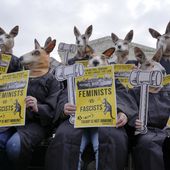LONDON — North Korea has expressed interest in a U.S.-backed proposal that it suspend its nuclear program and allow U.N. inspectors to verify the suspension as an initial step toward dismantling its nuclear capabilities, diplomats said yesterday.
During three days of talks in Berlin that ended yesterday, North Korea’s chief negotiator, Kim Gye-gwan, asked his U.S. counterpart, Christopher R. Hill, what the United States would be willing to do if the North turned off its nuclear reactor. A U.S. response, if any, was not made public.
North Korea’s foreign ministry today called the Hill-Kim talks “sincere and positive.”
In the upbeat assessment, the communist state said the talks yielded “a certain agreement,” but it declined to elaborate on the nature of the dialogue.
The ministry said the talks were held in a “sincere atmosphere.” Its comments appeared in a statement released by the country’s official Korean Central News Agency.
Mr. Hill flew to South Korea to begin briefing other governments involved in talks with the North. He also plans to visit China and Japan.
Secretary of State Condoleezza Rice said the United States had not changed its policy of refusing to negotiate directly with North Korea over nuclear weapons, but was trying to prepare for the next round of talks.
“We are not going outside the six-party framework to bilateralize our discussions with the North Koreans,” Miss Rice said.
The plan was first presented during six-nation talks in Beijing last month, which ended in deadlock.
In Berlin this week, the North Koreans offered their own ideas about how it could be implemented, said diplomats who asked not to be named because they were not authorized to speak about the closed-door sessions.
They also declined to share Mr. Hill’s response.
However, Mr Hill discussed the process of normalizing relations with the North in a speech on Wednesday.
Full normalization of U.S.-North Korean ties was envisioned in a Sept. 19, 2005, joint statement by the six nations, once the North scrapped its nuclear programs.
Other participants in the talks — Japan, China, South Korea and Russia — also offered political and economic benefits.
“We look forward really to establishing, consistent with our obligations under the September ‘05 agreement, a normal relationship with North Korea,” Mr. Hill told the American Academy in Berlin.
“Obviously, this is via a bilateral process, which will take some time,” he said. “But we are prepared to go on that road and to really offer North Korea a hand as it moves along that road.”
After the December talks, South Korean news outlets reported that a proposal had been made by the United States that included an offer of written security guarantees.
U.S. officials said yesterday that most of the ideas came from China, which hosted the negotiations.
“The Chinese really are the ones who put forward ideas in the last round of the six-party talks, and part of what the North Koreans are responding to [in Berlin] is that,” Miss Rice told reporters traveling with her to London after a five-day Middle East tour.
When the proposal was first made late last month, Mr. Kim refused to respond because he did not have instructions from Pyongyang. Once he received them, he requested a meeting with Mr. Hill, a U.S. official said.
In Berlin, Mr. Hill and Mr. Kim discussed “certain steps toward dismantling,” although the official insisted they would not amount to a “freeze,” a term used in a failed 1994 nuclear deal known as the Agreed Framework.
In 2002, the Bush administration accused North Korea of having a secret uranium-enrichment program while its single nuclear reactor, which makes plutonium, was shut down.
Since then, the North has restarted the reactor and it has tested a nuclear weapon, thought to be powered by plutonium from the reactor.



Please read our comment policy before commenting.